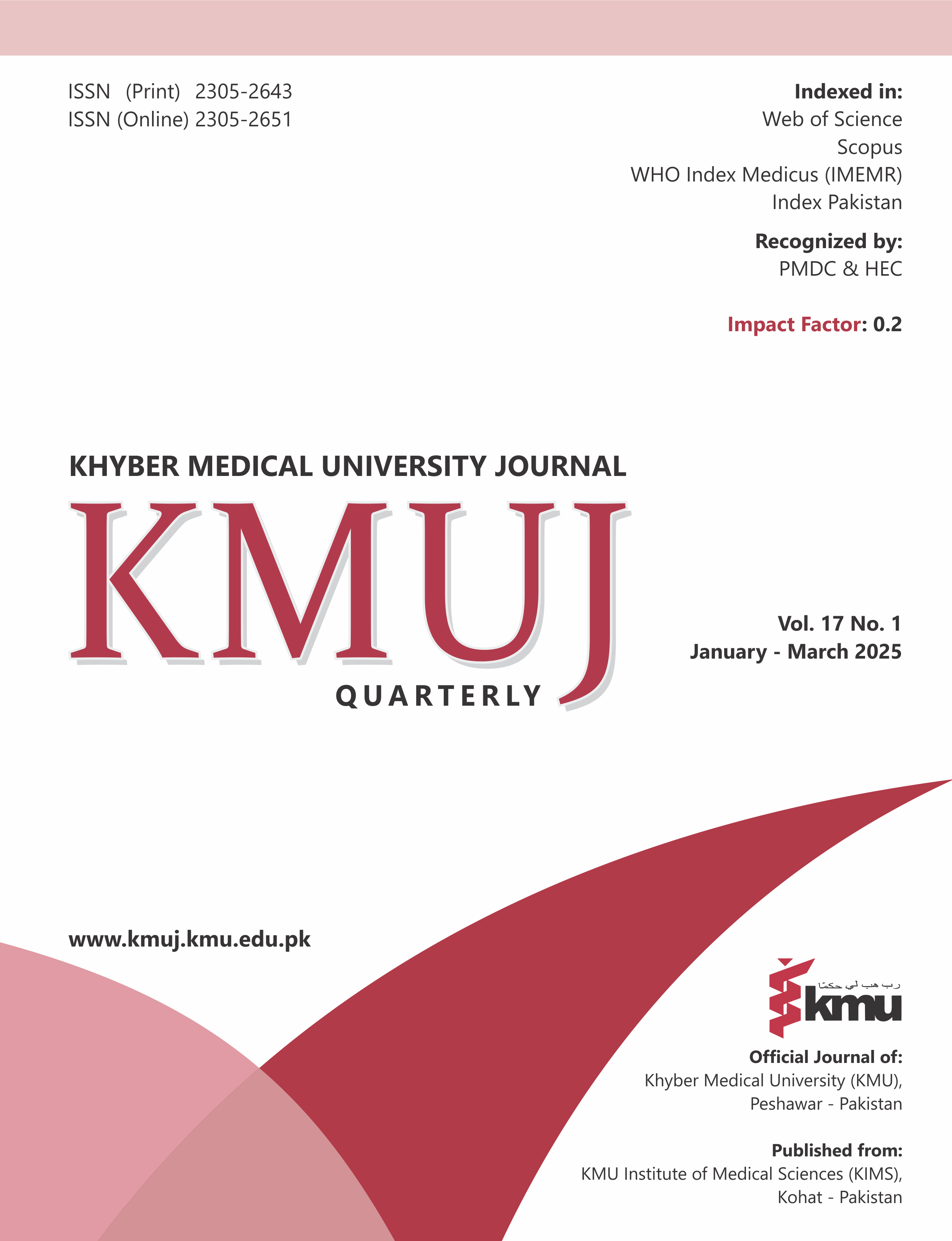Impact of class attendance on academic performance: insights from pre-clinical medical students in a modular system
Main Article Content
Abstract
Objective: To determine the association between class attendance and academic performance among second-year MBBS pre-clinical students enrolled in a modular system.
Methods: This retrospective record-based study was conducted in the Department of Medical Education at Gomal Medical College, Dera Ismail Khan, Pakistan. The academic performance of second-year MBBS students (session 2022–2023) was compared with their class attendance across three modular blocks: Block D (Neurosciences), Block E (Gastrointestinal and Renal), and Block F (Endocrine and Reproduction). Students were categorized into two groups: Category A (attendance ≥75%) and Category B (attendance <75%). The minimum passing score was set at 50%. Students on leave, transferred, or admitted late were excluded. Data were analyzed using descriptive statistics and the Chi-square test, with a significance level of p ≤ 0.05.
Results: Out of 121 enrolled students, 119 met the inclusion criteria. In Block D, Category A showed a pass rate of 51.31% versus 4.65% in Category B (p < 0.001). In Block E, pass rates were 69.07% (Category A) and 54.54% (Category B), with no significant association (p = 0.1928). In Block F, Category A had a pass rate of 66.67% compared to 34.21% in Category B (p = 0.00087). Combined analysis of all three blocks (n = 357) showed a significantly higher pass rate in students with ≥75% attendance (63%) versus those with <75% (26.21%) (χ² = 39.740, p < 0.00001).
Conclusion: Higher class attendance (≥75%) is significantly associated with better academic performance in the modular assessment system of pre-clinical medical students.
Article Details

This work is licensed under a Creative Commons Attribution 4.0 International License.
Work published in KMUJ is licensed under a
Creative Commons Attribution 4.0 License
Authors are permitted and encouraged to post their work online (e.g., in institutional repositories or on their website) prior to and during the submission process, as it can lead to productive exchanges, as well as earlier and greater citation of published work.
(e.g., in institutional repositories or on their website) prior to and during the submission process, as it can lead to productive exchanges, as well as earlier and greater citation of published work.
References
1. Hussain W, Ali W, Hussain M, Shahid MS, Qaiser A, Khurshid IK. Relationship between class attendance, sendup exams and professional performance in special pathology for fourth year medical students. J Soc Obstet Gynaecol Pak 2023;13(3):361-5.
2. Khilnani AK. Correlation between attendance and performance of undergraduate medical students in otorhinolaryngology: a retrospective cohort study. Indian J Otolaryngol Head Neck Surg 2023;75(4):3349-52. https://doi.org/10.1007/s12070-023-03995-9
3. Rasool QI, Showkat FB, Farooq SU, Gani M. Exploring the correlation between attendance and academic performance in physiology among phase 1st MBBS students: A comprehensive study. Indian J Clin Anat Physiol 2023;10(4):231-5
4. Narwade N, Bhalge U, Bhavthankar S, Bhalshankar N. Effect of class attendance and academic performance of first year MBBS students in biochemistry department: a retrospective observational study. Int J Pharm Clin Res 2024;16(5):415-9.
5. Dhengre PB, Jadhao AR. Attendance and academic performance of MBBS students in community medicine - a retrospective cohort study. Natl J Med Res 2020;10(1):6-9.
6. Riaz S, Sheikh M, Khan MT, Mumtaz A, Saghir M. The Association between Attendance and Academic Performance of MBBS Students of a Private Medical College in the Subject of Ophthalmology. Pak J Ophthalmol 2022;38(2):151-6. https://doi.org/10.36351/pjo.v38i2.1369
7. Hamdi A. Effects of Lecture Absenteeism on Pharmacology course performance in Medical Students. J Int Assoc Med Sci Educators 2006;16(1):27-30.
8. Al Shenawi H, Yaghan R, Almarabhe A, Al Shenawi N. The relationship between attendance and academic performance of undergraduate medical students during surgical clerkship. BMC Med Educ 2021;21(1):396. https://doi.org/10.1186/s12909-021-02833-2
9. Khan AA, Mahboob U. Correlation of academic performance with student attendance in pre-clinical and clinical years of undergraduate medical education. J Int Islamic Med Coll 2023;18(4): 279-85. https://doi.org/10.57234/jiimc.december23.1692
10. Khan MJ, Sethi A. The Integrated Curriculum: Call of Modern Era. J Ayub Med Coll Abbottabad 2020;32(3):285-6.
11. The Khyber Medical University Examinations Regulations, 2017 (Amended 2022) Section 4, (Semester System Examination) Section 4 para (d), The Khyber Pakhtunkhwa Universities Act 2012 (Amended 2016). Accessed on: September 14, 2024. Available from URL: https://kmu.edu.pk.
12. Rahman I, Mansoor S, Meraj L, Ahmad M, Dodhy MA, Sattar H. Faculty Satisfication Regarding Modular Teaching. J Rawalpindi Med Coll 2022;26(1):133-40. https://doi.org/10.37939/jrmc.v26i1.1880
13. Rehman R, Iqbal A, Syed A, Kamran A. Evaluation of Integrated Learning Program of Undergraduate Medical Students. Pak J Physiol 2011;7(2):37-41.
14. Joglekar S, Bhuiyan PS, Kishore S. Integrated teaching--our experience. J Postgrad Med 1994 Oct-Dec;40(4):231-2.
15. Cheema MA, Rehman A, Khalid S, Ali Hammad SM, Khan AR. Role of Attendance in Academic Performance of Male & Female Medical Students in the Pre-clinical Years: A Descriptive Study. J Univ Med Dent Coll 2022;13(4):513-7. https://doi.org/10.37723/jumdc.v13i4.682
16. Wynter L, Burgess A, Kalman E, Heron JE, Bleasel J. Medical students: what educational resources are they using? BMC Med Educ 2019;19(1):1-8. https://doi.org/10.1186/s12909-019-1462-9
17. Smith LB. Medical school and on‐line learning: Does optional attendance create absentee doctors? Med Educ 2012;2(46):137-8. https://doi.org/10.1111/j.1365-2923.2011.04182.x
18. Papadakis MA, Teherani A, Banach MA, Knettler TR, Rattner SL, Stern DT, et al. Disciplinary action by medical boards and prior behavior in medical school. N Engl J Med 2005;353(25):2673-82.
19. Yates J, James D. Risk factors at medical school for subsequent professional misconduct: multicentre retrospective case-control study. BMJ 2010;340:c2040. https://doi.org/10.1136/bmj.c2040
20. Persky AM, Kirwin JL, Marasco CJ, May DB, Skomo ML, Kennedy KB. Classroom attendance: factors and perceptions of students and faculty in US schools of pharmacy. Curr Pharm Teach Learn 2014;6:1-9. https://doi.org/10.1016/j.cptl.2013.09.014
21. Doggrell S. No apparent association between lecture attendance or accessing lecture recordings and academic outcomes in a medical laboratory science course. BMC Med Educ 2020;20:1-9. https://doi.org/10.1186/s12909-020-02066-9
